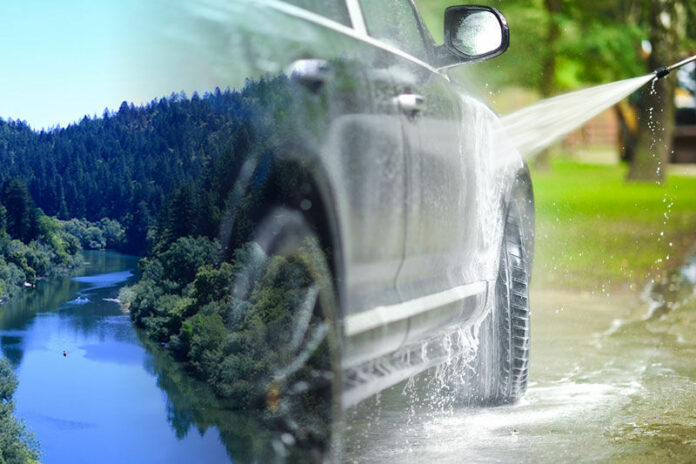Can you wash a car without wasting water and harming the environment? The answer is yes, if you plan ahead and understand that everything that’s been stuck to your car — gasoline, oil, heavy metal particles, tar and particulate matter from exhaust fumes — has the potential to flow from your wash area to the nearest storm drain and eventually reach the Russian River. Here are five simple tips to “go green” while washing cars, without wasting water or harming the environment:
Wash on a permeable surface (lawn, gravel, dirt). If you make only one small change in your car washing routine, let it be this. By moving your car wash to a flat non-paved surface, and away from storm drains, you allow the wash water time to be collected and absorbed into the soil where pollutants can be broken down naturally.
Take your car to a commercial car washing facility. Most commercial car wash facilities will filter rinse water and direct it to a sanitary sewer where it will get treated and possibly reused (recycled water). Moreover, according to the International Car Wash Association, the average person washing a car at home uses a whopping 80 to 140 gallons of water, as opposed to the 45 gallons typically used at a car wash.
Rethink your fundraising car wash. If you are a holding a community car wash on a paved area, plan to block the storm drains receiving the rinse water and pump the accumulated rinse water into a sanitary sewer inlet, or direct the water to a landscaped area where it can soak in. Before planning a fundraising car wash, please call your local municipality for the latest requirements and guidelines. You can get more detailed information by visiting: www.sonoma-county.org/prmd/sw/pp-home-carwash.htm.
Swap out cleaners for eco-friendly or homemade cleaners. There are several ready-made, ecofriendly car wash products available, some are even waterless. Homemade cleaners can save the environment and your money. Use natural ingredients like baking soda and vinegar. Try soaking a cloth with vinegar or denatured alcohol to soak and rub off dried bugs. Denatured alcohol will also remove tar and sap. Remember to rinse the treated area with water and rewax, as vinegar can strip a car’s finish.
Increase the time between washing or try a self-serve car wash station. Bring your own eco-friendly car wash products to a self-serve car wash station where pressurized water dispensers help to control and reduce the amount of water used in your wash. Wastewater from your wash will drain into sewer grates for proper treatment.
This article was authored by Sabrina Barron, Russian River Watershed AssociatioRWA staff. RRWA (www.rrwatershed.org) is an association of local public agencies in the Russian River Watershed that have come together to coordinate regional programs for clean water, habitat restoration, and watershed enhancement.









